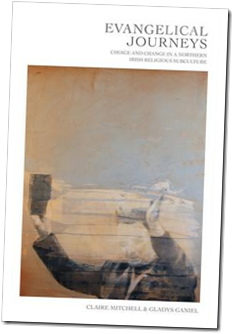 Claire Mitchell and I were guests this morning on BBC Radio Ulster’s Sunday Sequence. We discussed our new book, Evangelical Journeys: Choice and Change in a Northern Irish Religious Subculture, published this month by UCD Press. You can listen to the full interview with presenter William Crawley below.
Claire Mitchell and I were guests this morning on BBC Radio Ulster’s Sunday Sequence. We discussed our new book, Evangelical Journeys: Choice and Change in a Northern Irish Religious Subculture, published this month by UCD Press. You can listen to the full interview with presenter William Crawley below.
sunday-sequence-interview-31-july-2011
The main research question explored in the book is how people – specifically Northern Irish evangelicals – change their beliefs over time. On the back cover of the book we put it like this:
‘Why do some people become more religiously conservative over time, whilst others moderate their views or abandon faith altogether?’
As we explain in the interview, we were motivated to research this question in part because of our own religious backgrounds and the experiences of our friends. Claire was raised in a charismatic evangelical home in Belfast during the Troubles, while I was raised in a Bible-believing Baptist church in rural Maine, USA.
Both of us have seen our friends take various paths, from becoming evangelists, missionaries and worship leaders to working for poverty relief NGOs and cross community peace groups, to abandoning their faith. Claire now considers herself as having left evangelicalism, while I admitted to William this morning that on some days I’m probably a post-evangelical, but on other days I’m not so sure!
I think my own reluctance to put myself into a category reflects the dynamic nature of what in the book we call ‘religious journeys.’ We identify six:
- Converting to evangelicalism
- Deepening evangelicalism
- Maintaining a steady faith
- Moderating evangelicalism
- Transforming evangelicalism (that’s where they post-evangelicals show up in this book)
- Leaving evangelicalism
As we emphasise in the book, we think that people can and sometimes do move in more than one of these directions over their life, but that most are on a dominant path. We therefore identify the combinations of factors and patterns of experiences that are most likely to push and pull people in these different directions.
William’s interview, as usual, was admirably wide-ranging, including discussion about:
- some of the specific combinations of factors and patterns of experiences that we identified among people on the various journeys,
- the different ways evangelicals are responding to secularisation,
- the surprisingly diverse ways in which family relationships can impact on individuals’ faith,
- and the startling lack of political concerns in many evangelicals’ everyday lives.
We see our book as somewhat of a corrective to other social science literature on religious change, which often emphasises the role of structural, macro level factors in conditioning people’s religious beliefs and behaviour. We rather emphasise the remarkable degree of choice that people exercise within those structures, demonstrating that people on all types of the journeys are active agents in changing and maintaining their faith.
We also think the book moves beyond the previous academic literature on the role of evangelicalism in Northern Ireland, including my own 2008 book, Evangelicalism and Conflict in Northern Ireland – which is mainly focused on evangelicalism’s role in the conflict.
The book is written in a jargon-free style that we hope will appeal to interested readers as well as an academic audience. UCD Press is offering it at a 20% discount (22 euros) if purchased online from its website.
<a href="http://url" class="wpaudio">Artist - Song</a>
One thought on “Evangelical Journeys Interview on Sunday Sequence”